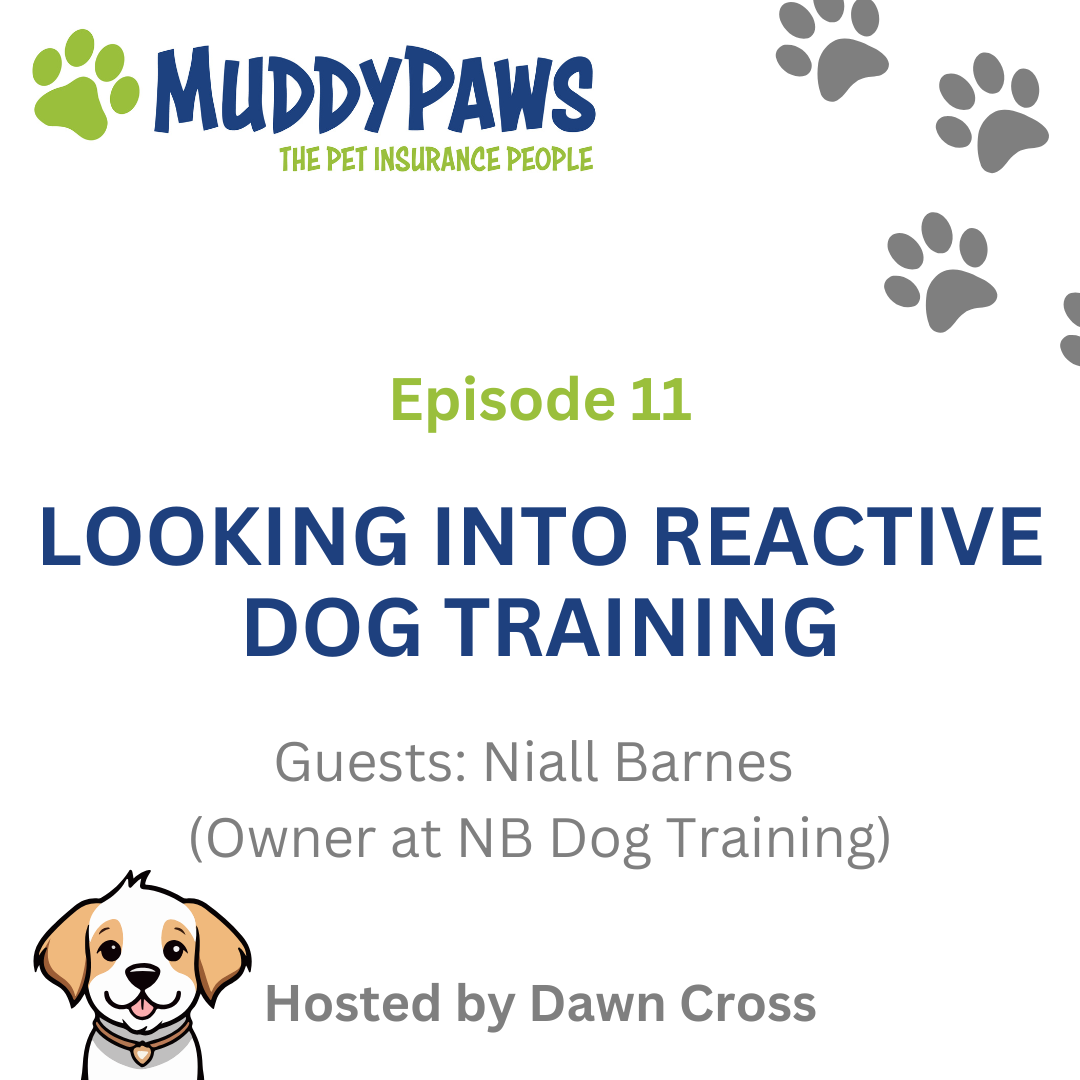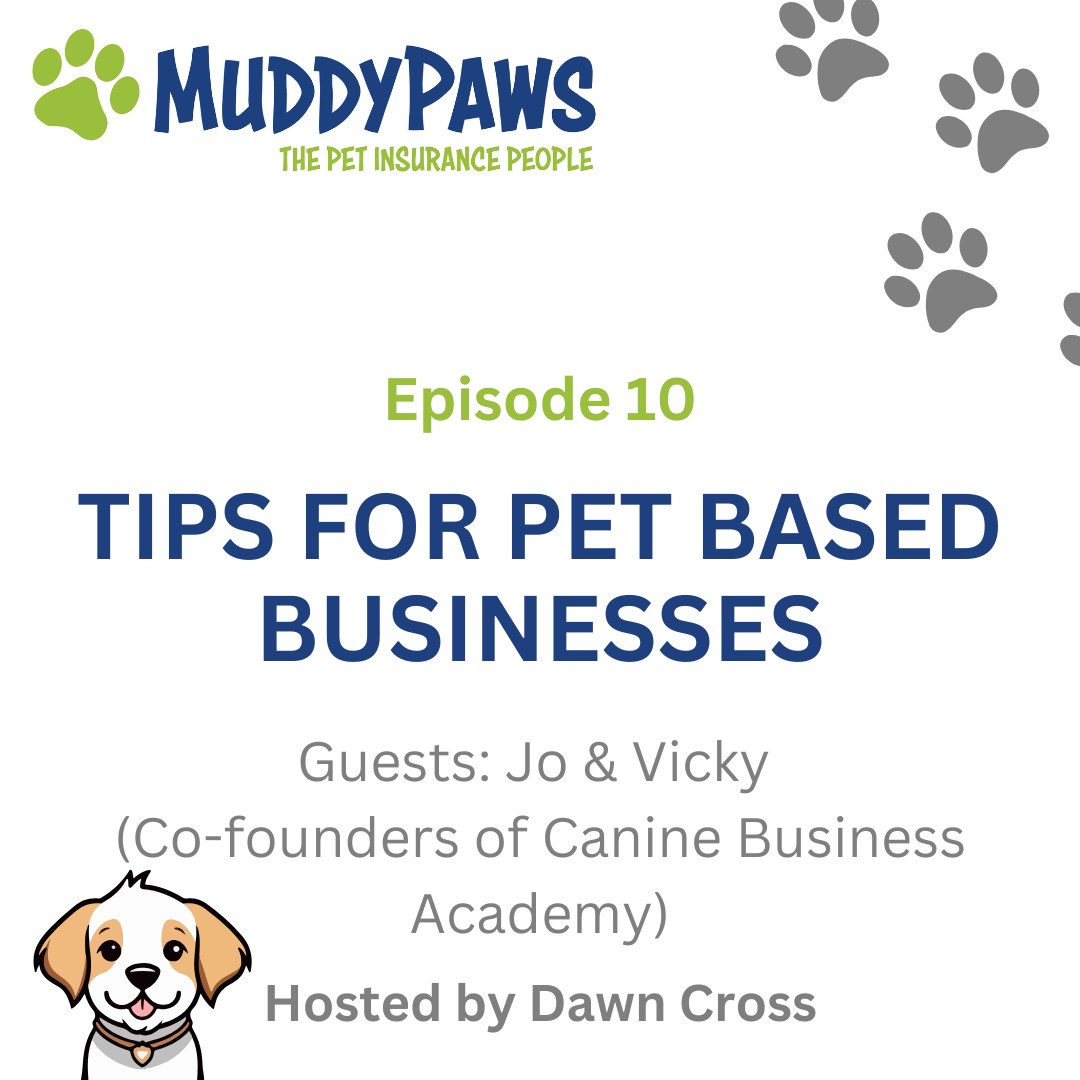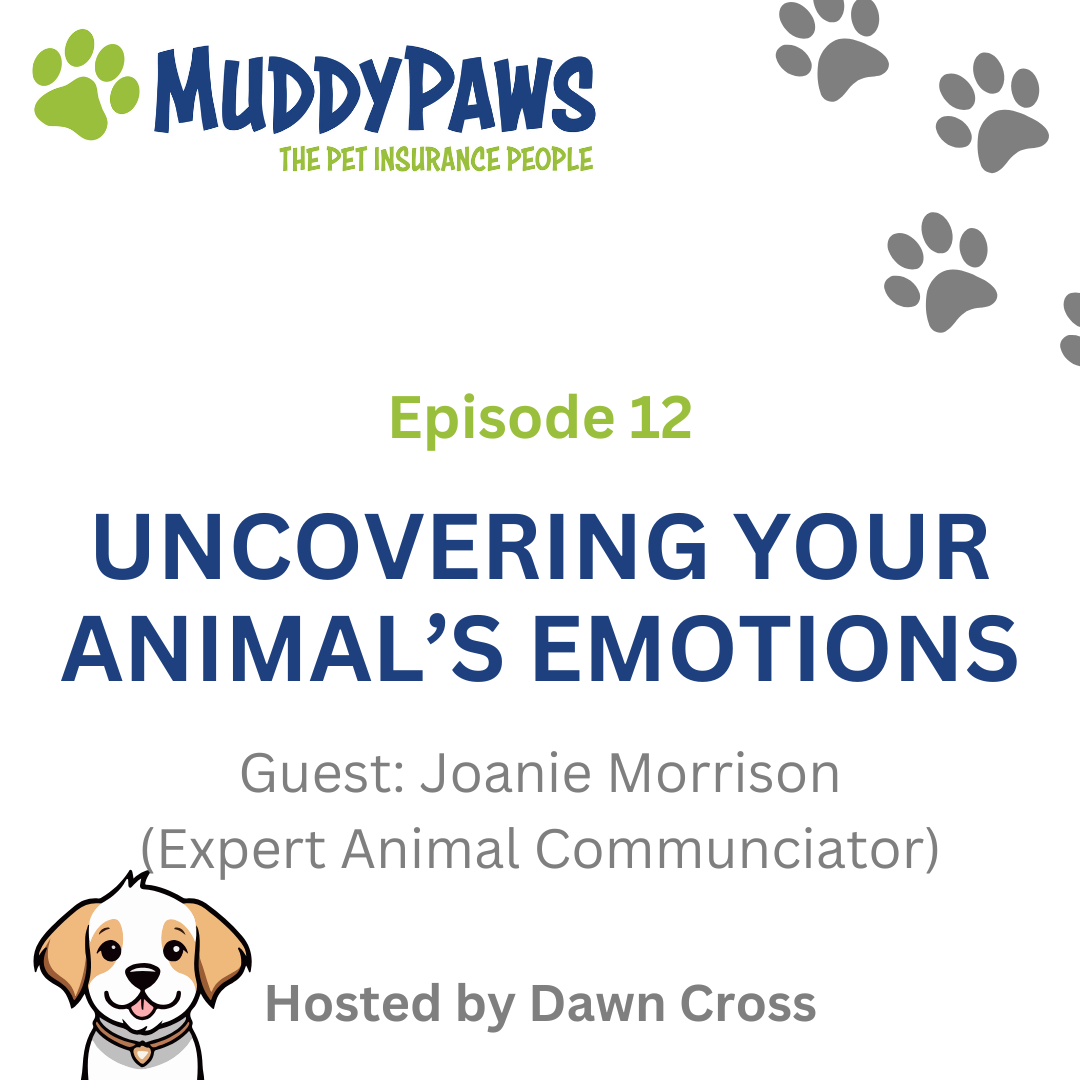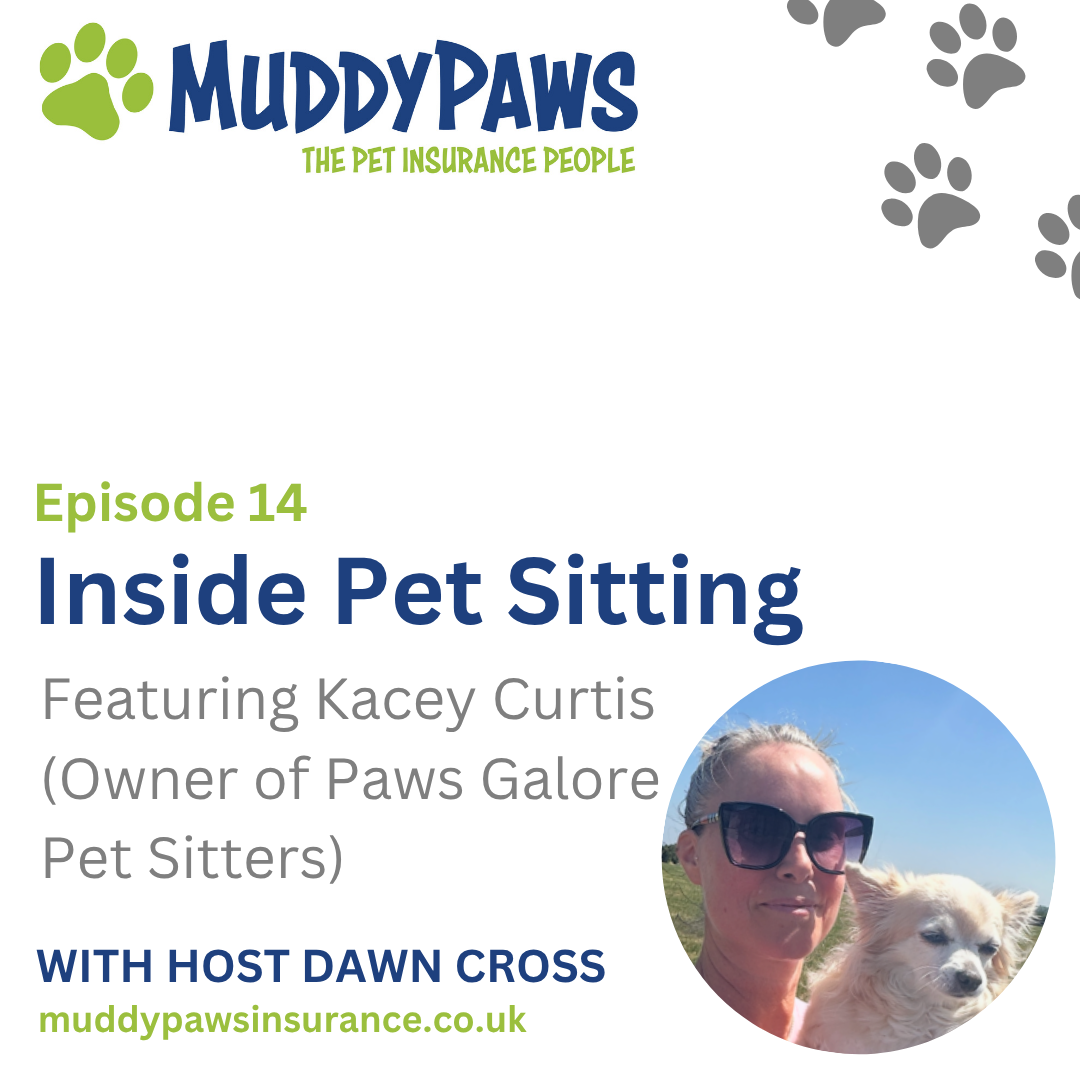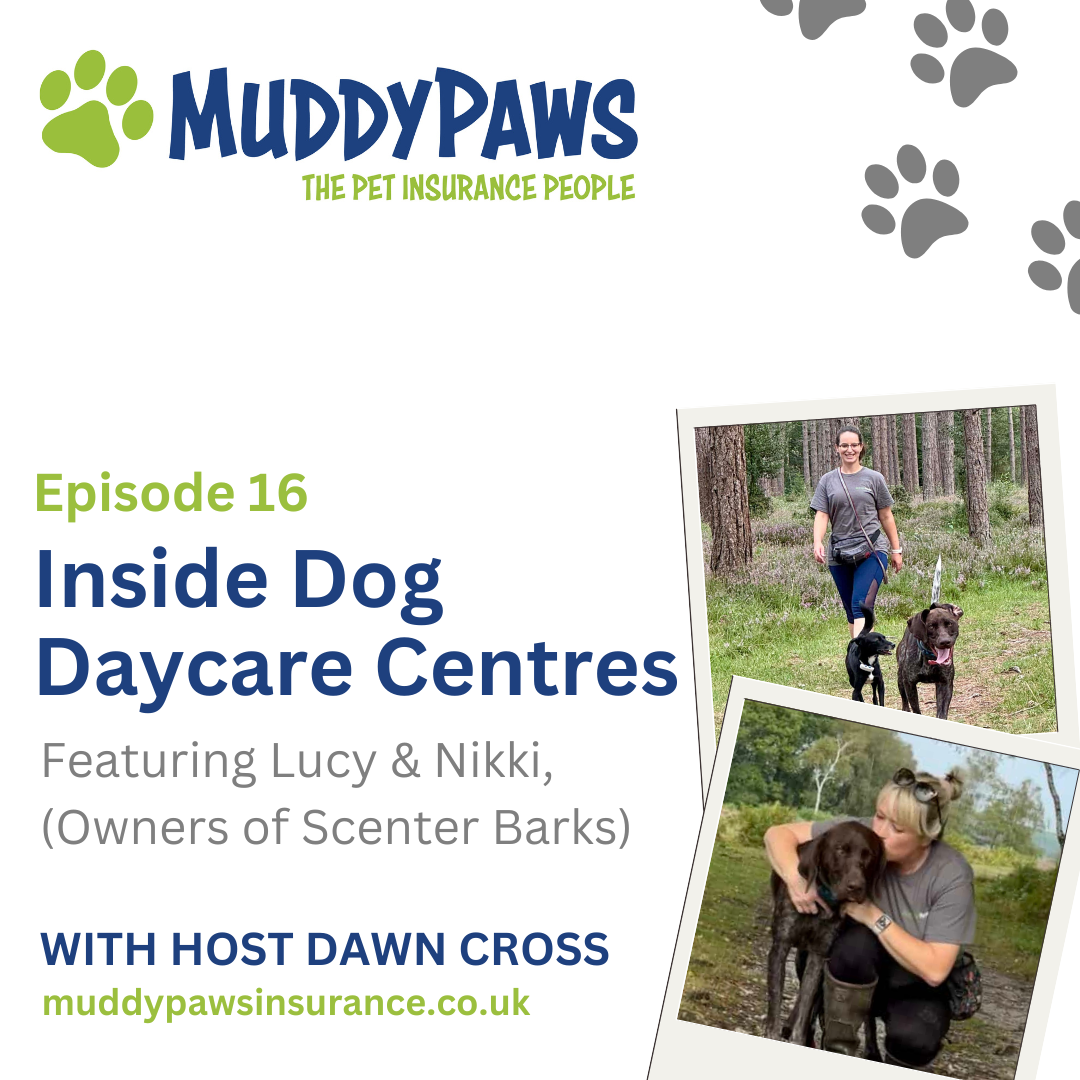Episode Transcript
[00:00:01] Speaker A: Welcome to the Muddy Paws Insurance podcast. I'm your host, Dawn Cross, and today I'll be chatting about reactive blog training with founder Nile Barnes, expert trainer and training business owner.
If you enjoy our podcast, make sure to leave a rating on your favorite podcast directory.
[00:00:20] Speaker B: So if I could get you to start off, if you can introduce yourself and what you do at your business.
[00:00:24] Speaker C: Yeah, so my name's Niall. My business is NB Dog Training. So we mainly focus on pet dogs. So it's not like agility or protection or sport or anything like that. It's. It's pet dogs that are making life a bit difficult for their owners, as a rule, or people who are getting puppies or new dogs and they want to make sure that they don't turn into difficult dogs later. So it's either resolving or preventing behavior problems, typically just your typical behavioral problems in pet dogs and doing it for coming up on five years. There's myself and one other trainer, Catherine, who, who do all of our, all of our training.
[00:01:04] Speaker B: It sounds amazing. So how did you get started into dog training itself?
[00:01:08] Speaker C: So I had a dog before I was a dog trainer. I had a dog with someone I used to be in a relationship with a while ago, and he helped me. After we broke up and we weren't together anymore, I had some mental health sort of issues, quite a bit of depression, anxiety, and I'm kind of missing like a year of, of my, of my life where I just don't really. I was in bed most of it. I didn't do much. I don't remember really any of it, but I remember the times I had, I had that dog. I had Enzo. So I remember those times. And that kind of. I thought, well, that's something that if I didn't have him, I'd have lost that year entirely. So I thought I'll want to give back to for him. So when I was preparing to get my next dog ad, I went all in on sort of getting as many qualifications and doing as much learning as I could to get it right for him. And then I realized I think I know a little bit too much now to just be doing this for my puppy. And people started asking, oh, could you help me with this? Could you help me with that? And I found that I had a bit of, a bit of a talent for it. I could, that could explain things that I'd learned in a way that the average dog owner could, could use. And it just kind of took off from there and it just never really stopped.
[00:02:31] Speaker B: That sounds amazing. I like how you just kind of utilize your own skills and whatnot. You know, I can probably help other people with like certain issues they're having and it's kind of born from your own passions.
[00:02:42] Speaker C: Yeah, yeah, it was exactly that. I thought that he did something for me that other dogs could be doing for other people. But for a lot of people, it doesn't go like that. He was just. He was. Because he was a. He was a fluke. He was so well behaved. But it wasn't because we did anything to make him that way. We just got lucky with the temperament of him. He was just chill, placid. He wasn't reactive. He didn't have any separation anxiety. He wasn't a nuisance barker. He didn't make a mess of that. He was just the ideal dog. But Bruno, through nothing we did, but then I saw a lot of people, it wasn't working like that. They got a dog hoping to have what I had, and instead they've got some. A dog in the house that's making life more difficult and is causing anxiety and depression instead of helping relieve in it. And instead of being that companion, they're being a. The detracting from the quality of life. And it's stressful for the owner because they love this dog, but they kind of don't like it and they don't feel like it's. It's worth having that dog in the life anymore. And that dog has to be rehomed. So I thought, I don't want that to happen to people if I could help it. So that's kind of why I started doing it. And a lot of dogs that we work with end up doing what they're supposed to, what they were hoping the dog would do for them, and don't end up needing to be rehomed or. Or worse.
[00:04:04] Speaker B: Yeah. So what's some of like the key behavioral issues that you find that dog rangers face?
[00:04:11] Speaker C: I think the main one we deal with is reactivity. So I'm in. So. So where I live, it's a semi urban town, so got quite a lot of open space, but quite a lot of sort of more urban spaces as well. And especially since lockdown, there's just so many more dogs out there. Everyone got a dog in during COVID that most people probably shouldn't have done. They. They got a dog thinking, oh, well, I've got nothing else to do and the pub shut and the football's not on, but I could still buy a dog, so let's do that. And everybody started getting These weird hobbies that they normally wouldn't have done. Everyone started hiking and doing all these things, and dogs seemed to be one of those hobbies that got pulled in. Then a lot of them went back to normal life and the dog didn't adapt to the change.
So. And even now, people that are getting dogs now they're coming across all these people with dogs that they're just a bigger number. So a lot of them weren't socialized well, and now they're kicking off and, and reacting to every dog they see or to people or to traffic or to whatever. And because it's the most intense behavior that tends to be where the most people will actually reach into the pocket and pay for. For someone to help fix it because it's, it's dangerous and it's an intense. And it's embarrassing for a lot of them that they dread going out. So I think we deal with that the most. I don't know if it's the most common issue out there, but it's the most common one people will actually pay for us to, to help them with. And then we get a lot of like, separation anxiety. Again, probably linked to Covid. People spent every minute in the house with the dogs and then went back to work and the dogs, oh my God, what do I do? What? I've never, never been on my own. And then other than that, it's just sort of, you know, attention seeking and nuisance barking and stuff like that. But primarily it's reactivity that, that we. We deal with the most.
[00:06:14] Speaker B: So one of the kind of things that people may be able to utilized to help combat it. Obviously each case is varied. Everything is individual. So, you know, this can't be a plaster for football.
Especially dog owners who are noticing that, you know, the dogs are very reactive. You know, we don't react well to certain things. You know, what's sort of like the first steps maybe they can take to try and help her a bit or kind of tone down the behavior.
[00:06:40] Speaker C: Yeah, I mean, you said that like there's not a template, which kind of annoyed me because when I was first starting to learn this, I was like, right, well, once I figured out how to do this, it'll be easy and it doesn't get any easier. Like you've got more skills to deal with it, but there isn't a template. I've done it in so many different ways with so many different dogs. But I think the overarching theme for reactivity tends to come down to the socialization of the Dog. I truly believe that it. People have a misunderstanding of what socialization means. So for me, it means habituation, exposure, getting the dog used to being around the things it needs to be around. In the same way that you and I could walk down a street in the center of town and see 300 people and not remember or notice a single one of them apart from some guy that was wearing a really funny hat or somebody that was dancing. Like, I might remember and look at them, but I won't see the other, the other 298 people unless I know them. But then when it comes to dogs, people in my experience are then taking them out. And if we see a dog, we go meet that dog. If we see a person, we go say hi. And the percentage of dogs that they see and actually interact with is just way higher than it should be. And it's not that they shouldn't be able to interact with things. It's that they interact with almost everything.
And then when they can interact with it, they get very frustrated and they start to pull and lunge, try to get to it and get all worked up. Or if they don't like all of these dogs and people that they're meeting and they expect that we're going to meet them, they will then kick off to create space and like, no, stay back. Because this idiot holding my lead keeps bringing me over to meet every dog. But if I bark at you, your owner will take you away. So it's either they don't like the dogs or they like the dogs too much. And then they create this explosive behavior to either get closer or to push the dog away, depending on the how they're feeling. And by that point, then you've got the reactivity. But the damage was done before the reactivity was present.
You know, just seeing the symptom.
So for me, I think if I could get one message out there, it'd be, get it right while the dog's young. Or when the first with you that, hey, hey, we're not going to bother with every dog we see. In the same way that if I walk down the street with my child, she's, you know, she's three years old, she's. These people aren't anything to do with you. Don't worry about them. They're not a threat, but they're not an opportunity either. Not everyone's going to give you chocolate, and not everybody's going to throw things at you. They're just minding their own business, and we'll do the same. So if I could get one message out there. It'd always be that, get your dog to the point where they can mind their own business. But if someone does want to interact with them and the dog does interact with them, it's not a massive deal. But they expect that it won't happen. Then if it does, it's just. It's a. It's a. An outlying event.
[00:09:46] Speaker B: Yeah, I understand that. Yeah. It's kind of like, you know, setting those boundaries and being like, you know, especially maybe when you do kind of first start bonding with them, whether they're young, whether you've adopted them, at whatever age, you know that it's when you're going to pick and choose, like, where you're going to go or who you're going to interact with as well, then it's like setting that standard as best you can as early as you can with yourself. So then the idea is that they will learn, like, that's how it's going to go. And obviously, if you keep it up, and it's been like when you set a habit for yourself as a human, isn't it the more you keep it up, the more instilled it is and the less likely they are to actually react or be frustrated that you're not doing all the fun bits, if that makes sense.
[00:10:26] Speaker C: Yeah, yeah. And I think a lot of people, the habit that they've set is we're going to go near and interact with these things and then that habit clashes with the dog's feelings. And that's where you get this. This imbalance. The dog's like, we're going to do this, but I hate doing this, but I expect that it's going to happen. So maybe if I try this explosive behavior, it won't happen. And if they'd. I think if the other. Because a lot of the time you can tell people focus on ignoring and just getting used to being around things. But you can always go the extra mile by making your dog think that the world just revolves around you. So especially early on when you get them, if we're outside and in. In these places where things are going on, I am just going to be the best thing I can possibly be for you. I'm going to be. There's going to be food, there's going to be treats, there's going to be toys, there's going to be affection, there's going to be whatever it is that you want for interacting with me. And while those other dogs are over there, they become a background distraction. They're not really there anymore. So, like right now, me and you are chatting and you're the focus of my attention. I'm not paying attention to any. The traffic that's driving past my house. It's just there.
It doesn't give them. It doesn't. None of my focus is drawn to it. I'm sure if a car crashed outside my house, I'd look. But other than that, the just traffic is just going past. But you're the focus of my attention. And if we can tap into what is it that our dogs enjoy the most. So for me, I've got a border collie, so it's a ball. So most of his socialization was done with. We're gonna go find busy places and I'm gonna play ball with you. And now all of the busy isn't that important because I might have a ball. And he's. He's got normalized to people and dogs and cars and bikes and footballs and everything else. Because I had the thing you wanted the most.
So trying to find what is that for your dog. And I think some people just don't know what that is. They just don't know what is my dog's, you know, the kryptonite, I guess. What's that? What's that big thing that will keep their attention and give me the ability to win against that distraction that that is out there.
And if people can figure that out, I think sometimes it's just trial and error. Like just try all the toys, try all the treats and see which ones observe your dog. Which ones make their eyes bulge out of the sockets, which ones make them sit up and listen, which ones make them even make them a bit rude? Like if. If you had hold of something, what would make your dog jump up at you to get it? What would make your dog bark at you to get it? What would make them the rude? Because then they want it enough that they might ignore another dog. And we can go spend time out there playing, interacting, doing whatever it is, knowing that I've got the biggest thing in the world to you as the dog. So, yeah, I think trial and error sometimes finding what is that, that silver bullet.
[00:13:35] Speaker B: Yeah, I think as well like thinking about the psychology or the behavior of the dogs as well. Like really paying attention to your dog and just how I think they interact with everything as well. Because I think people forget or maybe, you know, some people have had different experiences with raising dogs as well. Whether, you know, from a child and then you get one as an adult. You know, it's like, oh, yeah, they just do the thing. It's a dog thing. But really you need to pay attention to kind of every aspect as well, especially in those early days, because. To understand how they function, because obviously they can't just tell you what's up. Like if they're overstimulated or something's really bugging them, isn't it? You really need to pay attention to all the behavioral signs. Like, you know, is the tail is between the legs, if. Yeah, if they're lunging, that sort of thing. And I think that's something some people tend to overlook or forget, but it's quite a key thing to think about.
[00:14:22] Speaker C: Yeah, I think canine body language, it's such a nuanced thing. So there's, there's obvious signs, like you said, like, is the tail tucked to their ears flat? Are the, Are they licking the lips? Are the yawning of the.
And if you are able to just figure out what three or four of those things that I need to be really aware of. Because some people wouldn't know that a dog licking the lips is potentially a stress signal. Some people wouldn't know that yawning distress signal. Some people don't even know the tail tuck is a, is a, Is a sign of it. But I think if people are aware, oh, that is potentially a sign of stress. And is there any others? And if I can see more than one, especially, okay, what is it that that's going on? And then you can start to sense patterns. Oh, my dog always sucks their tail when there is a, you know, wagon going past. My dog always starts to lick their lips. When we have children in the house, my dog, like, whatever it is, you can start to sense patterns. And the better you are recognizing that, the earlier in the pattern, you can, you can interrupt and, and work on training it. Because a lot of people, they don't realize that there's a problem until the dog explodes and they're like, oh, my God, it came out of nowhere. It didn't. But this, the subtler signs just didn't get recognized and picked up on. And you didn't intervene and help your dog when they were, when they asked for it, purely because they speak in such a strange language that we don't innately understand until they really start to explode. And then we don't, you know, when they start to growl and back and lunge and snap. Oh, we understand that. And they've already been saying the same thing, just quieter and a little bit more discreetly and nobody listened.
Yeah, I think One of the things we do focus on with, with our, with the owners of the dogs we work with is trying to get them to the point where they can start to recognize, oh, something's going on with my dog here. What is it? What's going on? What's the environment? How can I make this better for them? Because if they can recognize them early, the dog starts to relax overall because they know my owner gets me and they know what I need when I'm stressed. They know when I'm stressed and they know what I need when I'm stressed. And if you recognize it early, your dog will then show less stress in general because they don't feel the need for it because they trust you and they believe that you're gonna, you're gonna intervene for them and step in for them.
[00:16:52] Speaker B: Is there anything else you'd like to add for any of our dog owner listeners?
[00:16:57] Speaker C: Yeah, I think for most of the dog owners that we work with, they're getting to the point where the problem has become too much and they now need professional intervention. And it's more expensive because it takes longer because the problem's ingrained, is more stressful. It's often less likely to work the more ingrained the behavior is. It doesn't always come out the way we want it to. So for me, I think it always be, if you think you suspect that you might need a trainer, do it.
And a couple of sessions to just course correct and get you on the right track will cost less, will be way less stressful, will probably be more enjoyable than trying to resolve it once it's, you know, once it's really, really far gone. So a lot of people, they're like, yeah, we thought about getting training or they'll even, I'll even get messages from people and then they'll, they'll see the price list, they'll see the timings, they'll see the availability, and then they'll think, do you know what? Meh. And then they'll message back like six months later. And I don't, I never delete the chat histories. So they'll message back six, sometimes like two years later, and they'll tell me the exact same thing, but worse and bigger that they told me a year ago or six months ago, two years ago, and now it's going to cost them more time from me, more effort, more, more time from themselves, more stress, and it's less likely than it was in the beginning to work. Whereas if they'd have just gone, you know what? Yeah, we'll just get you in to check that everything's okay. It's an investment when you do it that way, instead of a it's like paying for a service on your car instead of waiting until something falls off it and then fixing it, it's much easier to just keep on top of. So yeah, I'd always, I'd always say that's something that's definitely worth letting dog owners know that if you think you might need someone, you probably do. And if you didn't, you're just going to have a fun session with a dog trainer and maybe learn some fun stuff that isn't going to do any harm. But if there was a reason and if you did need them, you'll be really glad that you had them because you won't know how bad it would have been if you didn't have the session.
[00:19:14] Speaker B: Definite well, thank you so much for coming on today and sharing your girl's wisdom.
[00:19:18] Speaker C: Yeah, you're welcome. Thank you very much.
[00:19:23] Speaker A: Thank you to my guest today, Nile, for chatting about his knowledge about training reactive dogs and when to seek help. If you'd like to know more about his training services, please click the link in the description.
I have been your host, Dawn Cross and make sure to click Follow for more episodes.
Muddy Paws takes pride in keeping things simple. The goal is to provide a reliable insurance policy that is well delivered and gives you peace of mind, intelligent underwriting, a user friendly application and outstanding customer service. Ensure we stand out from the crowd and provide the best for your furry friends.
